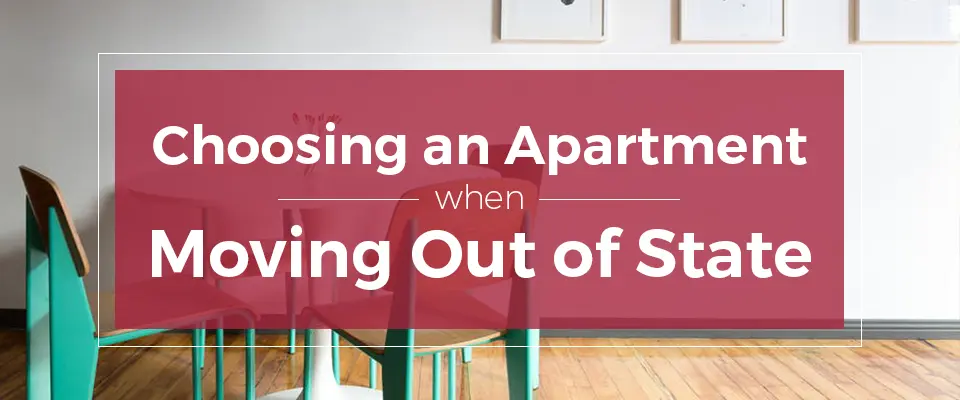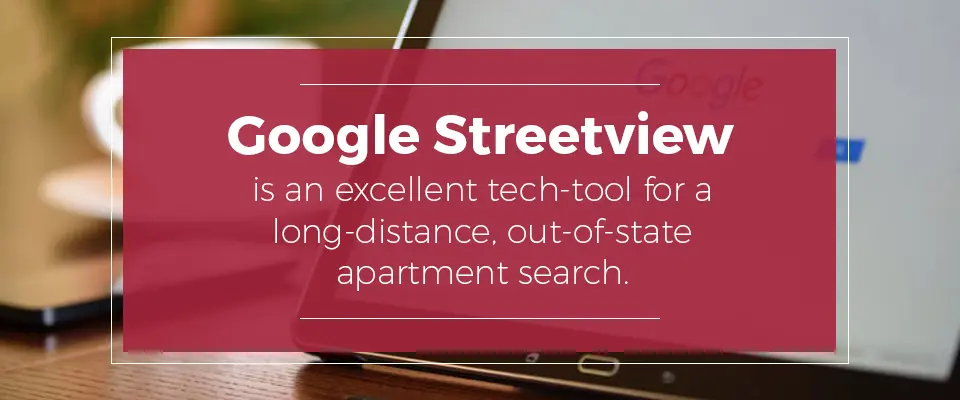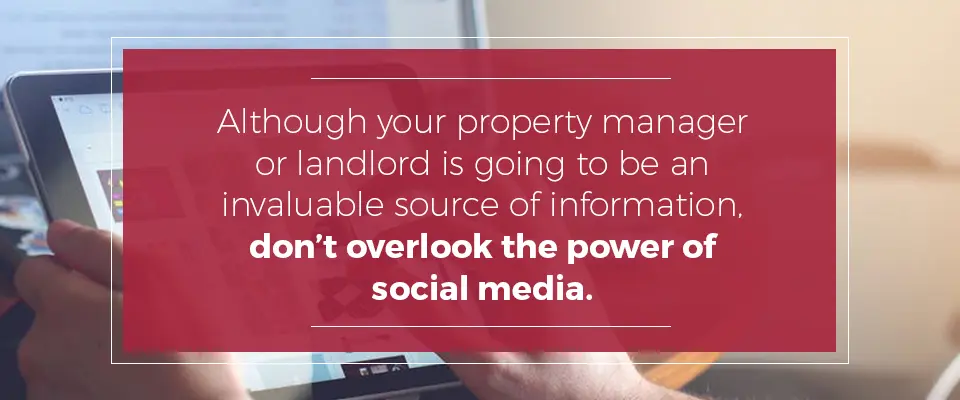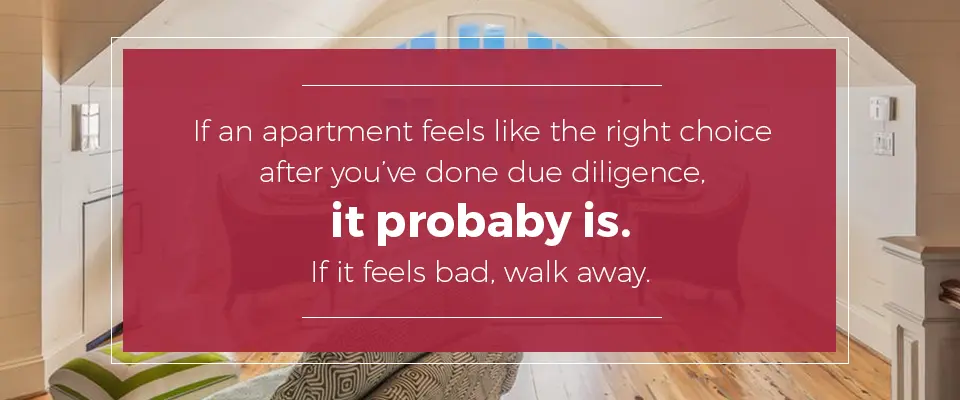

Looking for a new apartment in your home city can be stressful. There’s always uncertainty. You fret about making the right choice and getting something you’ll regret. Even though you know the local turf and what areas to avoid, you still worry about the landlord, who your new neighbors are and how safe you’ll be.
There are so many considerations to take in when apartment hunting. There’s always the challenge of finding something suitable that fits your budget. Then there’s the distance to work and a commute you can handle. And there’s always the issue of unknown extras like utilities, insurance, maintenance, emergency repairs and unexpected rent increases.
But what about long-distance apartment hunting? Suppose you’ve taken a job requiring you to move out of state and are moving without even seeing your apartment first. Talk about a stressful situation. Every unknown possibility is going to run through your mind. It’s enough to send some people panicking.
Panic doesn’t have to happen to you when doing a long-distance apartment search, though. Being prepared is the key to renting an apartment sight unseen in another state. Fortunately, in today’s interconnected world, there are many efficient tools and resources to help make your apartment search stress-free. Here are some of the best tips on how to rent an apartment out of state.
Starting early is the best strategy you can take. Prepare yourself by allowing ample time to organize and set priorities. If you realize and accept that you’re facing a potentially difficult challenge in remotely finding the right apartment, you’ll put yourself in a good mindset. You’ll have a realistic vision of what you want and need. You’ll also have a clear idea of what you’re not willing to compromise for.

A main part of preparing yourself for finding a rental apartment in an unfamiliar state is to make a list of specific needs or must-haves along with another list of wants or nice-to-have, but not critical. Your must-have list might include:
These points may be non-negotiable for you. They might also considerably restrict your options in finding a suitable apartment that fits your needs. That’s when it might be necessary to compromise. You may have to give up some of your wants or nice-to-haves such as:
Preparing yourself with lists of exactly what you need and what you’re willing to forego is your first long-distance apartment search step. Give yourself plenty of time to plan exactly what you’re looking for. When you’re specific, you won’t waste time pouring through listings that fail to qualify, and that’s going to prevent a lot of stress.
Thanks to technology, long-distance apartment searches have never been easier. The internet and mobile apps are tremendous tools for searching for and selecting a place that checks off all your needs list boxes and most of the ones on your wants. Resorting to the web is your next step in the apartment search strategy.
One of your first searches should be for a reputable property management company that operates in the specific state and city you’re relocating to. Experienced property managers know the area and the apartment rental market. Good property managers will save you a massive amount of time. They’ll also prevent a whole lot of stress.
Websites like ApartmentGuide, Padmapper and HousingMaps are all good resources. These specialized sites will quickly narrow down your search parameters and locate apartments that fit your budget range and needs. Triple Crown Corporation’s own Rental Communities search is another tool to help you with long-distance apartment hunting.
Once you’ve found interesting property managers or listings, make sure you check out their credibility by resorting to local forums, blogs or review sites such as Yelp. The Better Business Bureau is helpful for identifying shady landlords or even false ads. Beware of internet scams where people post fraudulent properties and take unsuspecting renters’ deposits and upfront payments.

Google Streetview is another excellent tech-tool for a long-distance, out-of-state apartment search. While you might find detailed photos or virtual video tours of an apartment’s interior, very few landlords or property listers will show you around the neighborhood. Spend a few minutes and insert the property’s address into Streetview. Take a walk around the block. What seems like a good online offer may turn out to be right in the middle of an unpleasant neighborhood.
Google is also great for gauging commute times. Google Maps has accurate directions linked to GPS systems giving you the distance from your prospective apartment to your new place of employment. It also calculates approximate driving times and suggests the best routes for your travel.
Once you’ve found interesting apartment prospects in a suitable area, then it’s time to qualify them with precise questions. Whether you’re working with a property manager or directly with the landlord, all reputable business people will be transparent in what they’re offering in apartment rentals.
Make sure you get acceptable answers to questions involving:
1. Rent and Regular Expenses
2. Building and Unit Information
3. Community and Local Amenities
4. Safety and Parking
These are just some of the questions to ask in qualifying an out-of-state apartment search. Create your own checklist that applies directly to your personal needs. Remember that every decent landlord or property manager will have heard all these before. They’ll likely volunteer information you’ve not considered, too.
Choosing an apartment when moving out of state will be much easier if you network with the right people. Although your property manager or landlord is going to be an invaluable source of information, don’t overlook the power of social media.

No doubt your network of friends and associates extends well beyond state lines. Tap into social media sites like Facebook, Twitter and other popular mediums. Simply posting what you’re looking for in an apartment is likely to be shared with others with something to offer. If they don’t know directly, they’re bound to know someone who does. Don’t be afraid to email someone who might help. It never hurts to ask.
You might have relatives or other acquaintances near your new area. They can possibly make a trip to apartments you’ve narrowed down and will share their opinion. Your new employer could also be an excellent source. If your company is large enough, they may have relocation services or advice within the human resources department.
You’d be surprised at the networking possibilities once you’ve put an apartment-seeking feelers out. Chances are that your social and professional network will save you much grief in choosing an out-of-state apartment.
Technology is great with instant photos being emailed and live video streamed to your device, but there’s nothing like seeing an apartment with your own eyes. Walking through a new place and experiencing the sights, sounds and smells gives you confidence you’re making the right choice. It’ll also tell you when to back away.
Depending on the distance you’re relocating to, it may be a wise investment to fly or drive out. Spending a few days personally checking out-of-state apartments may be well worth it. The cost of making an unseen decision may be terribly expensive.
If you’re forced to make a move soon after occupying your new apartment, you’ll face losing your deposit and incurring the cost of a second move. You’ll also pay for a bad decision in terms of lost time and unnecessary stress.
Your new employer may have resources to pay for your apartment-hunting trip. It may be part of your contract or something you can negotiate in advance. Teaming with a local property manager may also save some costs in local transportation as they tour you through inventory.
You’re going to get a far better feel by making a personal visit once you’ve narrowed down choices. It’s beyond experiencing just the apartment. It’s getting a sense of the block, the neighborhood and the entire city.
Identifying the right apartment is only part of the equation. You must also be prepared and qualified to enter a rental agreement or lease. Take into account that signing an agreement is a business transaction. It has to be favorable to both parties — landlord and tenant.
The property owner is interested in three main things:
Once you’ve picked the right apartment, do your best to have the landlord pick you as a tenant. In an active rental market, you can be sure of competition looking at the same apartments. They might be applying for the same unit. All landlords will assess who their best prospects are and will lean toward the most attractive.
Ensure you have the funds in place when signing a rental agreement. Most property holders will require a substantial deposit as well as the first month’s rent.
Listen to that small, still voice inside you. If it looks too good to be true or smells a bit fishy, then there’s probably something wrong. Your instincts are there for a reason. Make sure to follow your feelings.

If an apartment feels like the right choice after you’ve done due diligence, it probably is. If it feels bad, walk away.
Working with an experienced and reputable property management company is your best value in choosing an apartment when moving out of state. They know the area and the market. Property managers are professionals in the apartment rental business. They’re going to be more informative than most of what you’ll find during your online time.
Triple Crown Corporation is a long-established property manager serving Harrisburg, PA and surrounding areas. We provide outstanding customer care by aligning our properties and services to meet the specific needs of our clients. We provide high-quality, best value real estate services on time, every time.
For those who are relocating from out of state, we offer Skype tours to put your mind at ease. Contact Triple Crown Corporation today for your long-distance apartment search needs.